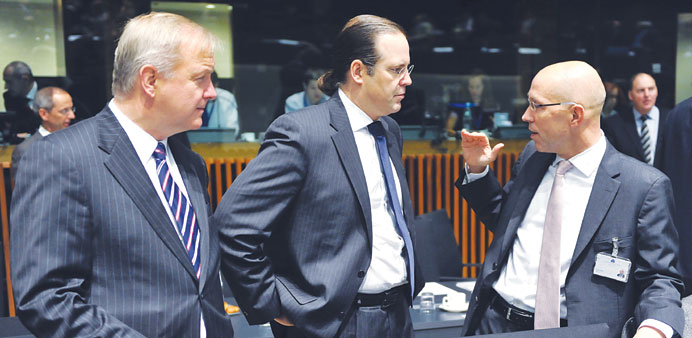EU Commissioner for Economic and Monetary Affairs Olli Rehn, Swedish Finance Minister Anders Borg and ECB board member Joerg Asmussen talk prior to the European Free Trade Association at an Economic and Financial Affairs Council, yesterday, at the EU headquarters in Luxembourg.
Britain drops opposition to ECB supervision in eurozone; Germany throws cold water on direct aid for banks; Time running out to agree scheme ahead of ECB tests
|
|
EU finance ministers agreed yesterday to give the European Central Bank sweeping supervisory powers in the eurozone but Germany dug in its heels on how to deal with failing banks, the second stage in building a banking union.
The European Union ministers gave their final approval for the ECB’s regulatory role nearly 1-1/2 years after the idea was first floated, with Britain dropping opposition to a plan it feared might threaten its control of London’s financial centre.
“We have written regulatory history,” said Michel Barnier, the European commissioner who drafted the plan for ECB supervision.
“This is a momentous step: the start of a new era for the supervision of eurozone banks.”
Five years after the financial crisis erupted, many European banks remain in trouble, holding back the eurozone economy as it gradually recovers from recession.
The EU is therefore trying to agree the next big step in its integration by creating a banking framework chiefly for the eurozone, which would both police the banks and find joint solutions to their problems.
Ministers won Britain’s support for ECB supervision of eurozone banks from the end of next year after offering fresh reassurances on its power to regulate the City of London, Europe’s biggest financial centre.
Yesterday’s decision endorsed an earlier European Parliament vote to give the ECB powers supervisory powers over the euro zone’s 6,000 banks. However, such a role would lose much of its influence without a body to deal with troubled banks.
Germany, Europe’s biggest economy, put the brakes on discussions about how to pay for rescuing or winding up any bank that gets into trouble.
Finance Minister Wolfgang Schaeuble all but dashed hopes that the eurozone’s rescue fund, the European Stability Mechanism, would help banks directly without making their home governments responsible for repaying the aid. Such a step was “not probable for the time being”, he said.
Between 2008 and 2011, the European Union spent the equivalent of a third of its economic output on saving its banks, but relied on taxpayers’ cash. In the case of Ireland, reckless bank lending almost bankrupted the country.
The issue of how to pay for bank clean-ups is pressing as Ireland and Spain prepare to end their reliance on international aid that shored up their banks during the crisis, concluding programmes that neither Dublin nor Madrid plan to renew.
Schaeuble spelt out a chief obstacle to directing eurozone aid for banks, drawing comparisons with Ireland’s history of rejecting European initiatives in referendums.
“In Germany, we need a change of German legislation, which is maybe as difficult as a referendum in Ireland,” he said.
EU leaders, who meet next week in Brussels, have also tasked their finance ministers with reaching a deal by the end of the year on a eurozone agency to close or salvage failed banks, the second stage of banking union.
With just 10 working weeks until the end of the year and their self-imposed deadline, talks are running into trouble because Germany fears such a scheme will leave it liable to pick up the bill.
France, Spain and Italy, on the other hand, want an immediate commitment by all 17 countries in the euro zone to stand by weak banks regardless of where they are.
The division was exposed by French Finance Minister Pierre Moscovici who accused Berlin in a book of holding up progress to protect its own “strange” financial system of regional banks that are “deeply intertwined ... with local political circles”.
Banking union, which economists consider as important as creating the euro more than a decade ago, aims to help countries to deal with problems at banks before they get out of control.
EU leaders are eager to trumpet Ireland and Spain as success stories after the four years of economic turmoil that started in Greece when Athens revealed its massive overspending and plunged the currency bloc into a crisis that threatened its survival.
While an ECB promise to buy government bonds calmed the panic about the euro’s future, many banks are still sitting on a mountain of loans that may go unpaid.
The International Monetary Fund estimates Spanish and Italian banks alone face €230bn ($310bn) of losses on credit to companies in the next two years.
Before taking on its supervisory role, the ECB will conduct a series of health checks on the eurozone’s 130 biggest banks next year, seen as the last chance for the bloc to come clean on losses that have festered throughout the financial crisis.
“This is fundamental and the tests have to be serious, with strict, rigorous scenarios,” Spanish Economy Minister Luis de Guindos told reporters.

